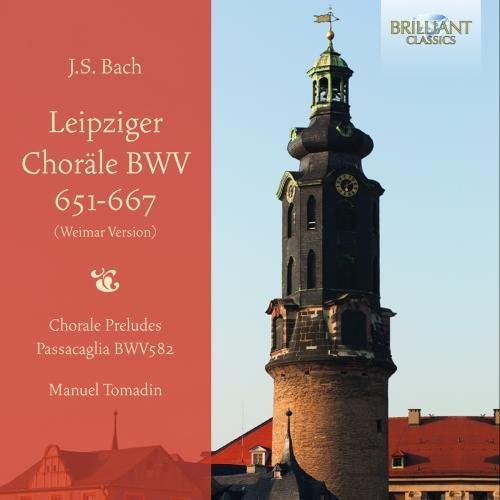
classical music distribution

(Produkt nie został jeszcze oceniony)
kompozytor
Bach, Johann Sebastian
tytuł
Bach: Leipziger Choräle, BWV 651-667
wykonawcy
Tomadin, Manuel
nr katalogowy
94456
opis
The C minor Passacaglia and Fugue is one of the great masterpieces for the instrument and one which inspired countless responses from composers great and lesser. So it's all the more astonishing to think that Bach wrote it while still a twenty-something hireling in Weimar, where his Kapellmeistership to the Duke ended badly with the composer being clapped in irons for touting his availability for other jobs, frustrated as his ambition was by the restrictions of the position. He had, however, managed to overhaul the organ of the court chapel in 1712–13, by collaborating with an organ-builder friend by the name of Trebs; both men had had plenty of experience upgrading instruments elsewhere, and it showed both in the colourful specification of the new instrument and the music that Bach was thereby able to write for it – none more spectacular than the spectrum of registers which the successive variations of the Passacaglia seem to cry out for. Bach also wrote plenty of 'bread and butter' chorales while in Weimar, of course, and later elaborated them, as was his wont, in Leipzig; here's a rare chance to hear the original versions.
nośnik
CD
x 2
gatunek
Muzyka klasyczna
producent
Brilliant Classics
data wydania
13-11-2019
EAN / kod kreskowy
5028421944562

(Produkt nie został jeszcze oceniony)
cena 64,00 zł
lubProdukt na zamówienie
Wysyłka ustalana indywidualnie.
Darmowa wysyłka dla zamówień powyżej 300 zł!
Darmowy kurier dla zamówień powyżej 500 zł!
sprawdź koszty wysyłkiProduktu jeszcze nie zrecenzowano, chcesz być pierwszy?
Klienci, którzy kupili ten produkt, kupili również
Berkeley, Lennox
Berkeley: Sacred Choral Music - Stabat Mater; Cantata "Batter My Heart"; Magnificat
REAM 1129
Pozostałe płyty tego kompozytora
różni kompozytorzy
WYCOFANY Organ of Thomaskirche Leipzig – Bach, Boëllmann, Buxtehude, Krebs, Mendelssohn
ROP 6117
różni kompozytorzy
L’inverno degli flauti - Christmas Music by Bach Corelli Debussy …
MDG 308 1932-2
różni kompozytorzy
WYCOFANY Sauer-Orgel der Thomaskirche zu Leipzig – Bach, Reger, Liszt, Rheinberger, Brahms
ROP 6092
różni kompozytorzy, Bach, Johann Sebastian, Schmelzer, Johann Heinrich
A German Bouquet
CDR 90000114
Pozostałe płyty tego wykonawcy
Bach, Johann Sebastian, Buxtehude, Dietrich
December 1705 - Buxtehude & J.S. Bach: Organ Music
95941
Napisz recenzję dla: Bach: Leipziger Choräle, BWV 651-667
Zapytaj o dostępność produktu
Twoje zapytanie:
Odpowiemy na adres:
Produkt został dodany do koszyka

Bach, Johann Sebastian
Bach: Leipziger Choräle, BWV 651-667
1 szt












































